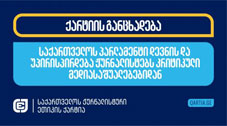
Georgian Charter of Journalistic Ethics Condemns Parliament's Use of 'Punitive Measures' Against Media
By Liza Mchedlidze
Friday, June 7, 2024
The Georgian Charter of Journalistic Ethics released a statement condemning the Parliament's use of "punitive measures" against the media. In the past few days, four journalists from TV Pirveli, Mtavari Arkhi, and Formula had their work accreditations suspended in Parliament at the request of Georgian Dream MPs, following critical questions from these journalists.
The Charter noted that following the approval of the "Foreign Influence" law, Parliament has intensified its repressive actions with a new approach.
The Charter urged the Chairman of the Parliament to stop using the resolution as a tool of revenge against journalists. It also called on the Ethics Council of the Parliament to address the behavior of members who regularly exhibit aggression towards journalists. Additionally, the Charter appealed to the Public Defender to respond to this harmful practice, which restricts the freedom of critical media and deprives their audience of information about the activities of the legislative body.
"Upon adoption of the resolution, the media and civil society expressed doubts about its stated goal of regulating relations between members of parliament and journalists. Practice has confirmed this suspicion. The Parliament abuses the resolution to introduce self-censorship, intimidate journalists, and isolate them from parliamentary processes.
Because accreditation is given to journalists by name, media outlets cannot replace sanctioned journalists with other employees. As a result, for a period of one to six months, these journalists are not given the opportunity to receive information firsthand from the legislative processes within the legislative body.
Journalists inform the charter that following the adoption of the resolution, the attitude towards them in Parliament and their working conditions have significantly deteriorated.
Rather than setting an example of openness and transparency for other agencies, Parliament is employing all means to deprive independent and critical media outlets of the opportunity to pose critical questions.
Members of Parliament from the ruling party and their affiliated political forces fail to grasp the essence of their mandate. Instead of fostering engagement with critical media, all their efforts are geared towards reducing contact with them," the statement reads.
According to the Charter, this practice deprives the public of access to the ongoing legislative processes in Parliament, which citizens have a legitimate interest in.

